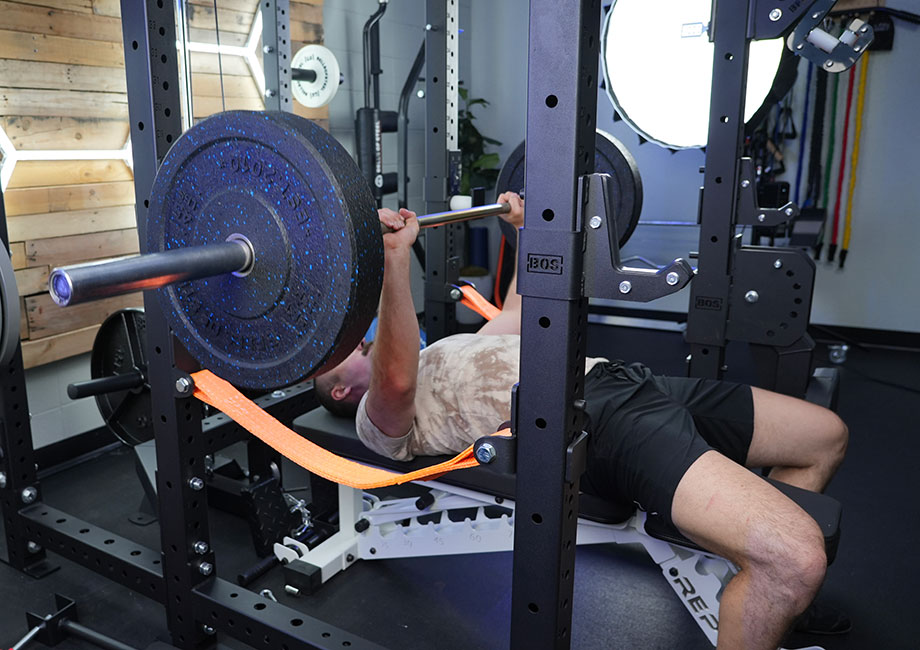We test and review fitness products based on an independent, multi-point methodology. If you use our links to purchase something, we may earn a commission. Read our disclosures.
As your resident online fitness gurus, we at GGR have noticed a trend or two in our time. While we haven’t conducted an official survey to confirm this, we’re willing to bet that most fitness folk would choose chest day if asked their favorite training day of the week.
RELATED: Best and Worst Fitness Trends
Chest day features staples like push-ups, chest dips, and one of the undisputed GOATs, the bench press. You’ll be hard-pressed, no pun intended, to find a vacant bench station on a Monday, lovingly referred to in the gym community as International Chest Day, as people worldwide ease off the weekend and get back to earning their reps.
Thankfully, the bench press isn’t the only essential exercise to program into your chest day workout. Caine Wilkes, OLY, USAW-L1, and GGR staff writer, provides his personal list of the best chest exercises with step-by-step instructions.
10 Best Chest Exercises
Your chest deserves the best. Read on for the best chest exercises!
Barbell Bench Press
Why do it: The barbell bench press is ostensibly the most popular lift in the world, and for good reason. Few exercises provide as much upper body muscle activation, meaning you should see substantial increases in your chest muscle size and strength by bench pressing regularly.
How to do it:
- Lie on a flat bench beneath a racked and loaded barbell.
- Grip the bar with your hands slightly outside of shoulder-width.
- Inhale deeply, brace your core, pinch your shoulder blades together, and exhale as you unrack the bar, positioning it directly over your chest muscles.
- Inhale again as you lower the bar to your chest, lightly touching at the bottom.
- Exhale as you push the bar back to the starting position.
- Continue for reps then rerack before the next set.
RELATED: Best Weight Bench
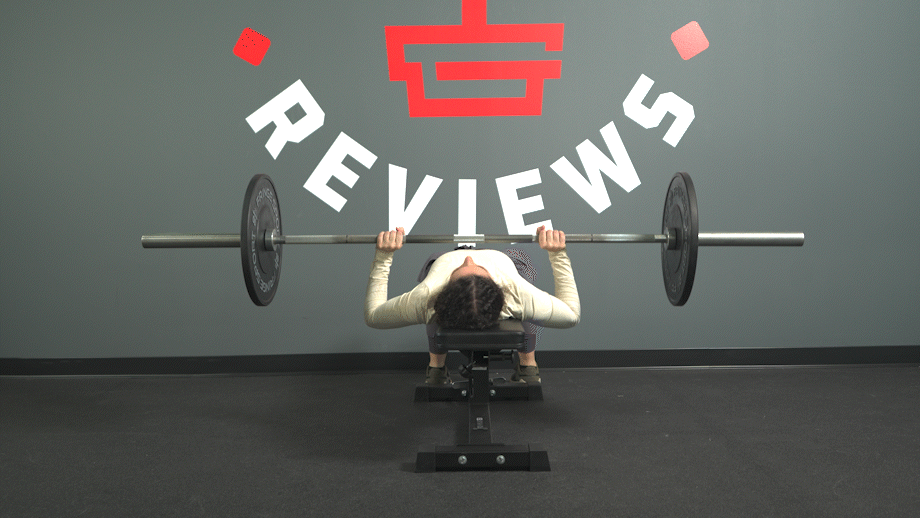
Incline Bench Press
Why do it: According to the International Journal of Environmental Research and Public Health1, “an inclination of 30 [degrees] produces greater activation of the upper portion of the pectoralis major.” So, for well-rounded development of the pectoral muscles, you’ll want to use the flat bench press, incline bench press, and decline bench press rotationally.
How to do it:
- Rack and load a barbell to the desired weight, then set an incline bench to between a 30-degree and 45-degree angle and sit. Grab the bar with an overhand grip.
- Inhale, brace your core, pinch your shoulder blades, and exhale as you unrack the bar.
- Inhale again as you lower the bar in a straight line to your chest.
- Lightly touch your upper chest, then exhale and press the bar to its starting position.
- Repeat for reps then rerack before the next set.
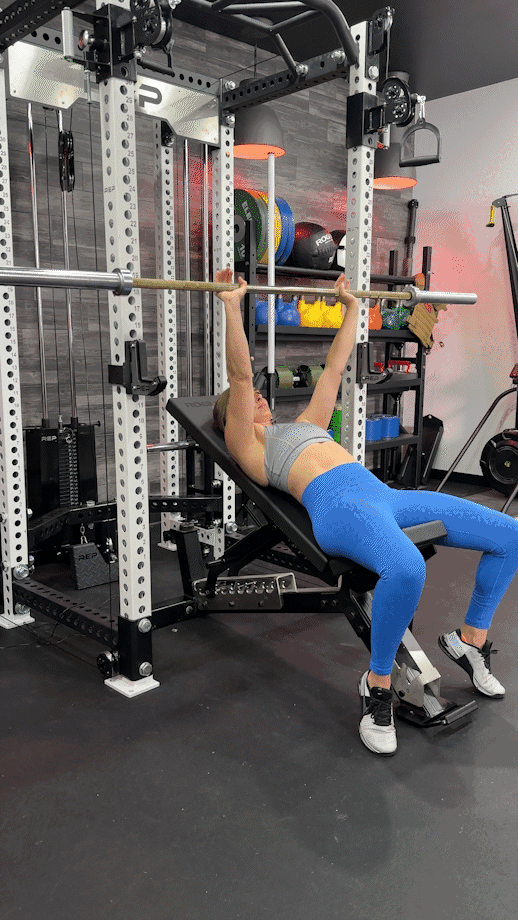
Dumbbell Chest Fly
Why do it: “A lot of chest exercises involve pressing or pushing,” says Caine Wilkes, OLY, USAW-L1. “That’s why chest flyes are so valuable. The dumbbell fly is one of few exercises that uses adduction rather than extension, meaning you’ll build muscle while improving mobility thanks to its unique movement pattern and wide range of motion.”
How to do it:
- Lie back on a flat weight bench, holding a pair of dumbbells with your palms facing each other.
- Press the dumbbells until your elbows are nearly fully extended.
- Slowly lower the weights out to your sides, maintaining a slight bend in your elbows.
- Continue until the weights reach shoulder level.
- Reverse the movement, bringing the dumbbells back over your chest.
- Reset and repeat for reps.
RELATED: Best Dumbbells
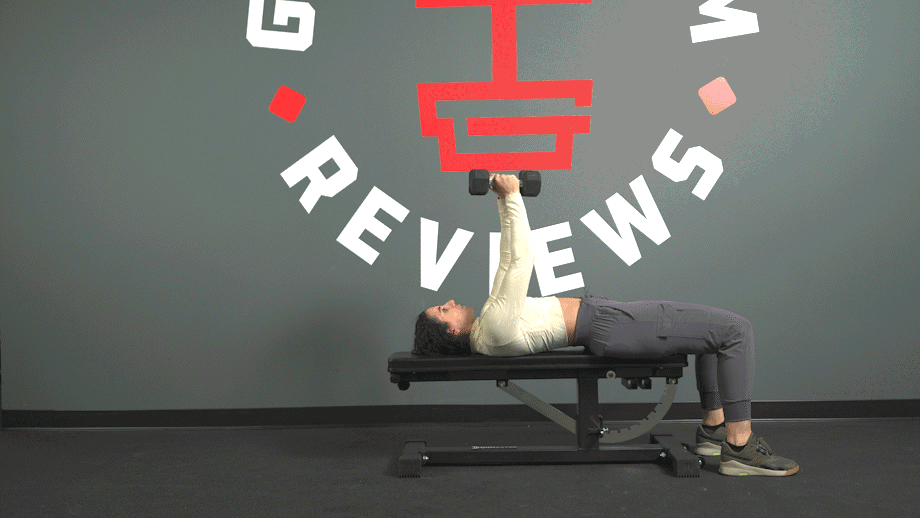
Dumbbell Bench Press
Why do it: A study in the Journal of Strength and Conditioning Research2 found that the dumbbell bench press elicited more muscle activation in the pec major than its classic barbell counterpart. So, it’s well worth it to occasionally trade your trusty barbell for a pair of dumbbells.
How to do it:
- Sit at the end of a flat bench with a dumbbell resting on each thigh.
- Thrust the dumbbells into the air using your legs as you lie back on the bench. Your starting position will have you lying supine with your lower back slightly arched, your shoulder blades pinched together, and the dumbbells directly above your chest.
- Lower the dumbbells until they’re just outside your chest.
- Pause, then press the dumbbells back to the starting position.
- Repeat for reps.
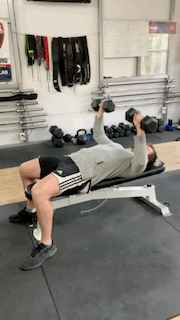
Push-Up
Why do it: We all know push-ups are the quintessential bodyweight movement, but what does exercise science say? According to the Journal of Exercise Science and Fitness3, push-ups are “comparably effective for muscle hypertrophy and strength gain” as a low-load bench press.
How to do it:
- Place your hands shoulder-width apart on the floor, then step both feet back to get into a high plank position. Your body should form a straight line from head to feet.
- Bend your elbows to lower yourself to the floor.
- Lightly touch the floor with your chest, then push yourself back up.
- Repeat for reps.
RELATED: What Muscles Do Push-Ups Work?
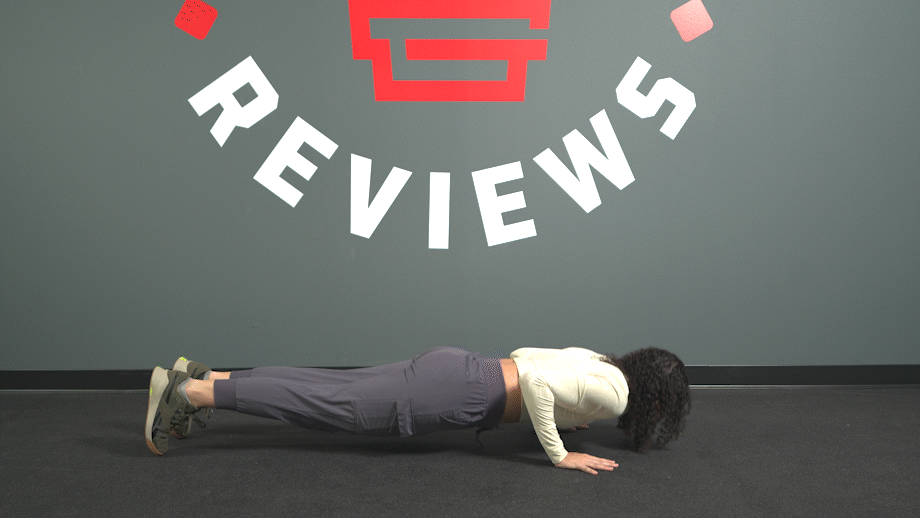
Cable Crossover
Why do it: “Cable machines provide constant tension throughout the range of motion, so you get similar hypertrophy at lower loads compared with free weights,” says Caine. “The cable crossover is particularly great at isolating the chest muscles.”
How to do it:
- Attach a D-handle to your cable machine and set the pulley to the highest position.
- Grab a handle with each hand, using a neutral grip, then position yourself so that you are standing dead center of the cable machine. Step forward to create tension.
- Lean your upper body forward, maintaining a slight bend in the elbow.
- Pull the handles down and across your body, squeezing your chest muscles at lockout.
- Slowly guide the handles back to the starting position.
- Reset and repeat for reps.
RELATED: Best Cable Machines for Home Gyms
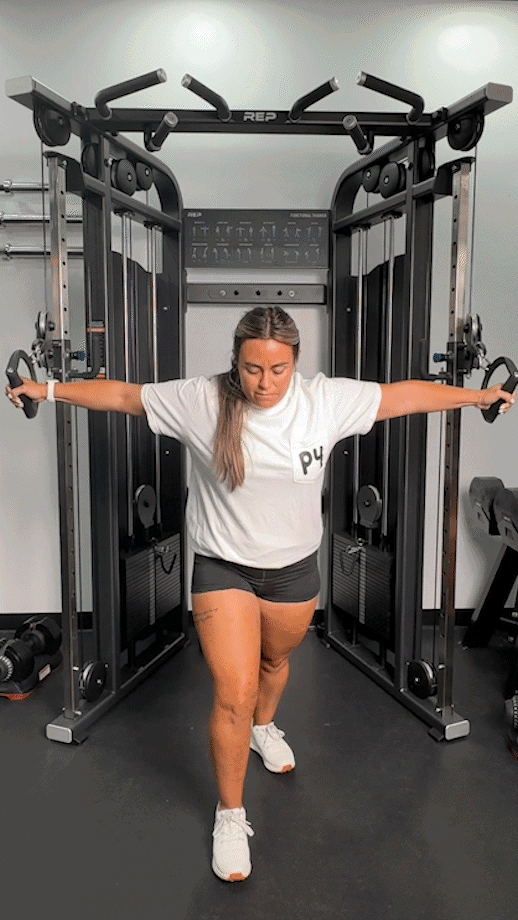
Dumbbell Floor Press
Why do it: Beginners may struggle with the regular dumbbell bench press’ range of motion and inadvertently place stress on their shoulder joints. The floor press exercise eliminates this possibility since the floor is right there to stop you from lowering your arms too far, making this variation safer for hitting your chest and triceps.
How to do it:
- Lie supine on the floor with your knees bent, feet planted, and a dumbbell in each hand.
- Press the dumbbells over your chest until your elbows reach lockout.
- Squeeze the contraction, then slowly lower the dumbbells until your upper arm and elbows lightly touch the floor.
- Reset and repeat for reps.
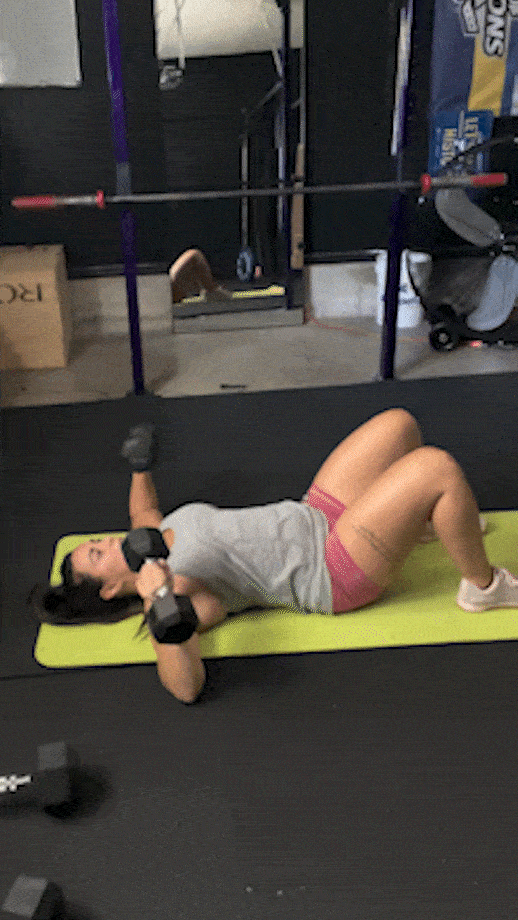
Chest Dip
Why do it: Chest dips are simple, but there is power in their simplicity. Using minimal equipment, this super effective bodyweight movement targets muscle groups in your chest, shoulders, and arms to greatly improve your upper-body strength.
How to do it:
- Stand between a set of parallel bars or rings and grip the handles with a neutral grip.
- Lean forward, then slowly bend your elbows to lower yourself down.
- Continue until your elbows form 90-degree angles, push yourself back up.
- Reset and repeat for reps.
RELATED: Dips Vs Pull-Ups
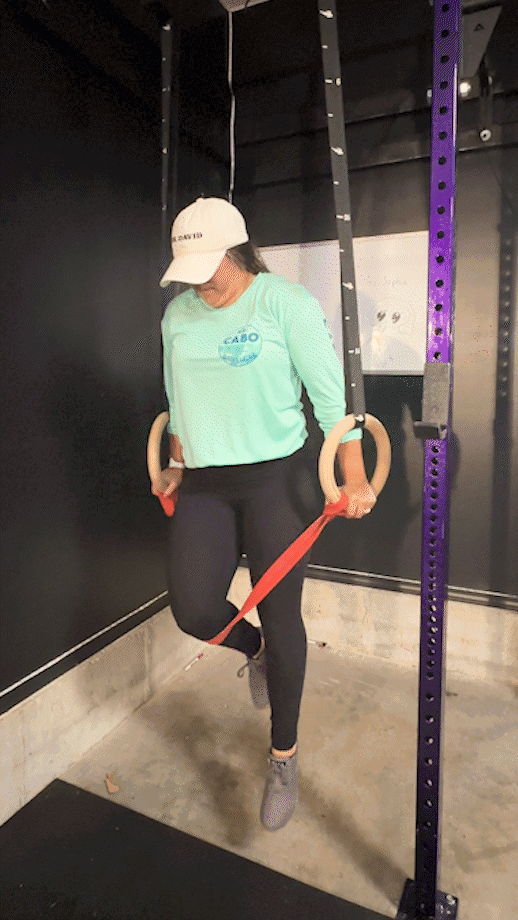
Dumbbell Pullover
Why do it: “Dumbbell pullovers are one of my favorite moves for targeting the lower chest muscles,” says Caine. “They hit plenty of upper body muscles, but they also expand the rib cage, which improves mobility, flexibility, and your breathing, too.”
How to do it:
- Lie back on a flat bench with your upper back and shoulder blades pressed into the bench.
- Hold a single dumbbell with both hands over your head.
- Keeping a slight bend in your elbows, slowly bring your arms back and behind your head with control.
- Push the dumbbell back up to the starting position.
- Repeat for reps.
RELATED: Low Chest Workouts
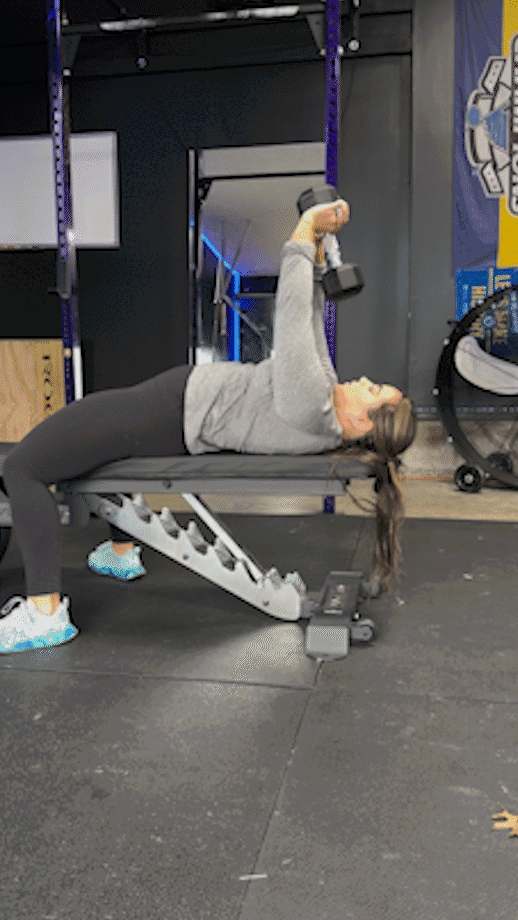
Close-Grip Push-Up
Why do it: A study published in the Journal of Strength and Conditioning Research4 found that push-ups performed with a narrow hand placement produce greater muscle activation in the pectoralis major and triceps brachii compared with shoulder-width or wide base push-ups.
How to do it:
- Get into the push-up position, except place your hands closer than shoulder-width.
- Lower yourself to the floor by bending your elbows, keeping them tucked into your body.
- Lightly touch the floor with your chest, then push yourself back to the starting position.
- Repeat for reps.
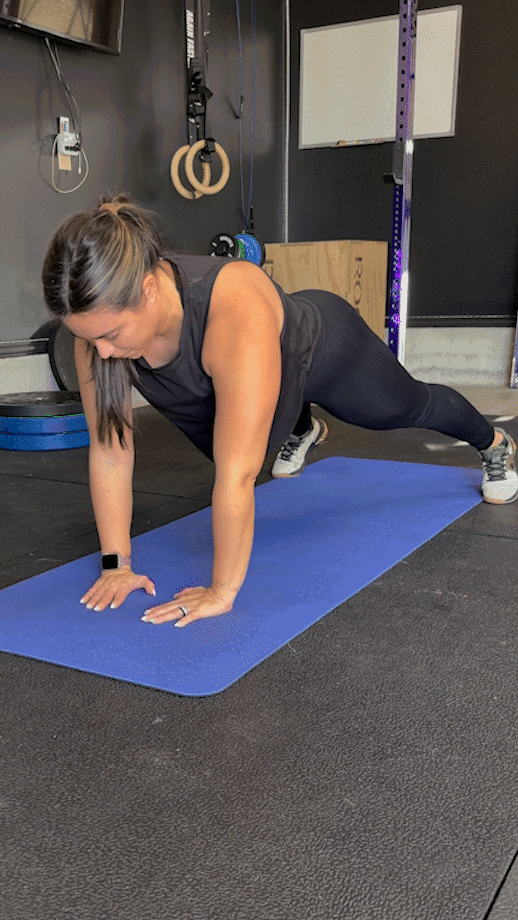
How to Warm-Up Your Chest
We know you wanna barge into that gym, rack that bar, and blast out bench reps like a savage beast, but there’s no reason you can’t be savage and smart, right?
Studies show5 that a proper warm-up substantially reduces your risk of injury by raising your heart rate, improving blood flow, and increasing the elasticity of your muscles, so you’ll want to lead with a great chest warm-up before getting into your working sets.
“Dynamic movements and stretches get your blood flowing, but it’s also important to warm up the shoulders and thoracic spine,” says Caine Wilkes, OLY, USAW-L1. “It seems strange to focus on the shoulders and back when it’s a chest training day, but warming up these key areas will help you generate power more efficiently.”
RELATED: Best Warm-Up Exercises
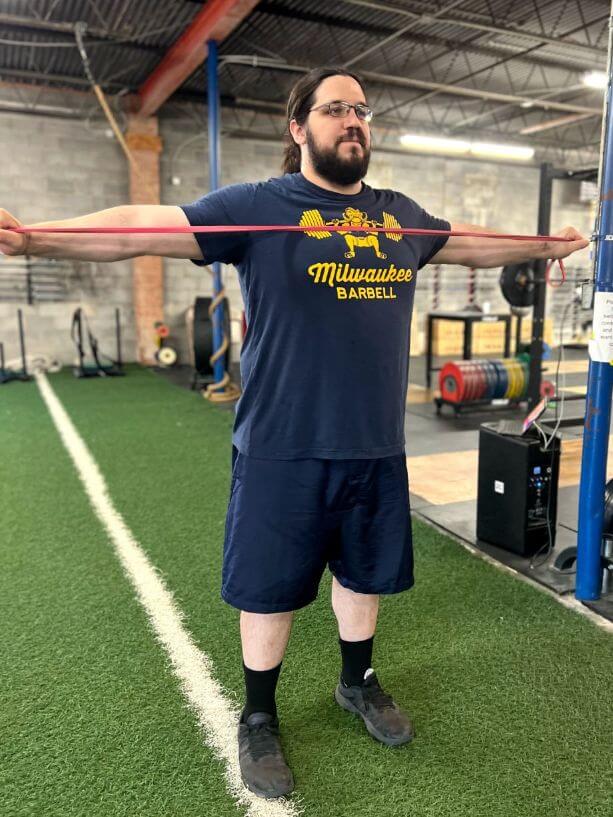
Here are a few stretches and movements to work into your chest warm-up:
- Arm swings and circles: This gym class classic is easy, simple, and effective for warming up your shoulder joints.
- Push-ups: Don’t overdo things, especially if push-ups will feature in your workout later on. Doing a few quick reps helps prep your shoulders, chest, core, and other key areas.
- T Push-Ups: Better yet, bring one arm into your chest, rotate it outward, and extend it towards the ceiling at the top of your push-up. This is an excellent chest opener.
- Pull-Aparts: Hold a light resistance band in front of your chest and, as the name suggests, pull it apart. This activates your chest and upper back, making it a great movement to do before bench and chest presses.
Combined with stretching, foam rolling, or mobility exercises, you’ll be primed and ready to annihilate your chest workout. Who knows; maybe you’ll even hit a new bench press PR!
Best Chest Workouts to Try
Knowing the best chest exercises will only get you so far. Here are a few sample workouts to help you go all the way!
Beginners
Beginners and casual lifters may not feel confident going super hard on their chest. Here’s a great beginners workout to help you gain familiarity and build a stronger foundation.
| Exercise | Sets | Reps |
| Bench Press | 2-3 | 3-5 |
| Dumbbell Chest Fly | 2-3 | 8-12 |
| Incline Bench Press | 2 -3 | 3-5 |
| Cable Crossover | 2-3 | 8-12 |
| Push-Up | 2-3 | 8-12 |
“As far as weight goes, choose something you can complete all reps with on all sets. The last one or two reps on your last set should be challenging,” says Caine Wilkes, OLY, USAW-L1. “Otherwise, focus on moving slowly through each exercise, prioritizing form, and worry about adding weight later.”
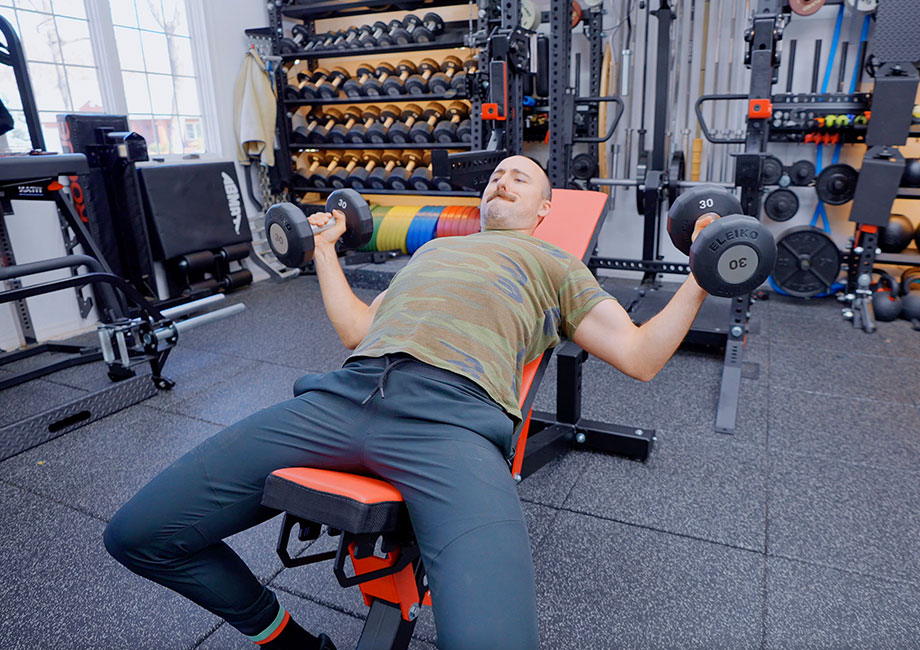
And, of course, beginners should always take all the rest they need between sets.
Hypertrophy
So, you’ve mastered the fundamentals and you’re ready to prioritize muscle growth? Recent studies show6 that lifting approximately 60% to 70% of your one-rep max (1RM) using a moderate rep range, roughly 6 to 12 reps, ought to do the trick.
Here’s a good chest workout designed to maximize hypertrophy.
| Exercise | Sets | Reps |
| Incline Bench Press | 3-6 | 6-12 |
| Dumbbell Chest Fly | 3-6 | 6-12 |
| Dumbbell Bench Press | 3-6 | 6-12 |
| Dumbbell Pullover | 3-6 | 6-12 |
| Cable Crossover | 3-6 | 6-12 |
RELATED: How Many Reps To Build Muscle
Bodyweight
No equipment? No problem! Here’s a chest workout using only bodyweight exercises.
| Exercise | Sets | Reps |
| Push-Up | 3-6 | 6-12 |
| Chest Dip | 3-6 | 6-12 |
| Close-Grip Push-Up | 3-6 | 6-12 |
RELATED: At-Home Bodyweight Workout
Benefits of the Best Chest Exercises
Chest workouts aren’t just for strength athletes and bodybuilding champs. Everyone can benefit from incorporating chest exercises into their strength training program.
Here are a few notable (and pec-tacular) benefits of including the best chest exercises in your workout routine.
Increased Strength, Size, and Endurance
Targeting and strengthening your pectoralis major, pectoralis minor, and serratus anterior helps you increase your chest’s strength, power, and endurance. That’s great for improving your sport performance and weightlifting, but it’ll also assist in completing everyday living activities like lifting, holding, and carrying objects.
Stronger chest muscles also means you’re less likely to get hurt while just living your life.
Improved Posture
A 2018 study in the Journal of Physical Therapy Science7 found that tight chest muscles, namely the pectoralis minor, may pull the shoulders forward into a rounded position, resulting in poor posture.
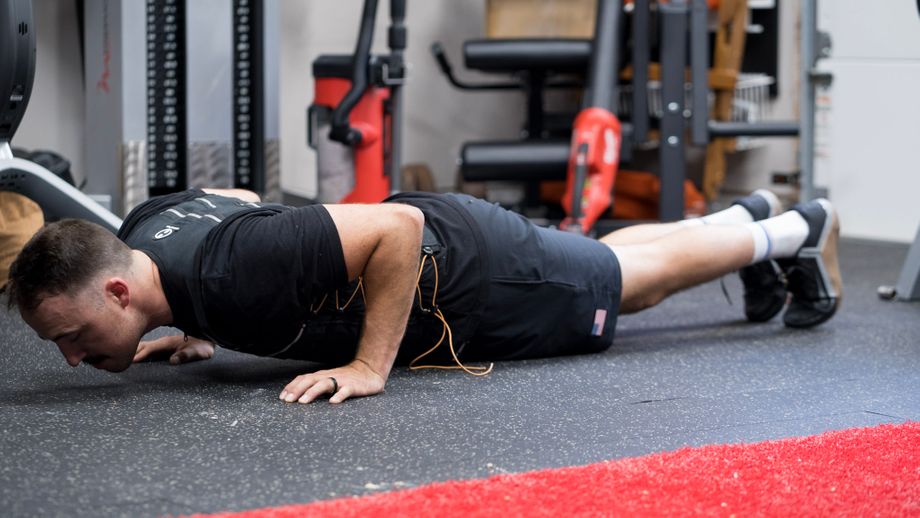
Stretching and strengthening these muscles can help you maintain better posture, which promotes greater health and well-being.
Better Breathing
A 2020 Journal of Exercise Rehabilitation8 study reports, “Respiratory muscle strength is positively associated with chest wall expansion, diaphragmatic movement, and functional capacity.”
That’s because chest exercise helps strengthen and lengthen your pec muscles, which sit atop your rib cage and assist in chest expansion during respiration.
The effect of your chest muscles on breathing is so profound that a 2020 study published in the International Journal of Environmental Research and Public Health9 acknowledged that, while conditions such as COPD are irreversible, “passive stretching of respiratory muscles can clinically improve the condition of such patients, especially in terms of chest expansion.”
Best Chest Exercises: Final Thoughts
Training your chest is about more than just getting strong and looking great. There are various functional fitness benefits to enjoy from regular chest exercise, including:
- Improved posture
- Improved respiration
- Increased muscle strength, size, and endurance
- Greater ease completing everyday living tasks
- Greater overall quality of life
Try working some of the best chest exercises into your next chest strength training day or, better yet, take one of our sample workouts for a spin. You won’t regret it!
Best Chest Exercises: FAQs
What is the most effective chest exercise?
When performed with proper form and scaling, all the chest exercises listed above, such as push-ups, dumbbell flyes, and cable crossovers, are proven effective. However, if we had to pick one essential chest exercise to put on the “no-cut” list, it’s the barbell bench press. There’s a reason it’s a classic.
What exercise activates the pecs the most?
We’d have to go with the dumbbell bench press as it provides the most muscle activation to the pecs, as stated by a study in the Journal of Strength and Conditioning Research2. You’ll also get loads of muscle activation performing the dumbbell chest fly.
Will 50 push-ups a day do anything?
“Performing 50 push-ups a day, due to the muscle activation throughout the upper body, should provide vast improvements to your overall strength and fitness,” says Caine Wilkes, OLY, USAW-L1, and GGR staff writer, “but that doesn’t necessarily make it the best way of achieving those results.”
If you’re a minimalist, it’s not a bad strategy, but incorporating free weight, cable, and other bodyweight exercises beyond just push-ups should help you accomplish the same goals.
For personalized recommendations and a tailor-made plan, we recommend consulting a certified personal trainer or other qualified fitness professional.
RELATED: Best Online Personal Trainers
References
1. Rodríguez-Ridao D, Antequera-Vique JA, Martín-Fuentes I, Muyor JM. Effect of Five Bench Inclinations on the Electromyographic Activity of the Pectoralis Major, Anterior Deltoid, and Triceps Brachii during the Bench Press Exercise. Int J Environ Res Public Health. 2020;17(19):7339. Published 2020 Oct 8. doi:10.3390/ijerph17197339
2. Farias DA, Willardson JM, Paz GA, Bezerra ES, Miranda H. Maximal Strength Performance and Muscle Activation for the Bench Press and Triceps Extension Exercises Adopting Dumbbell, Barbell, and Machine Modalities Over Multiple Sets. J Strength Cond Res. 2017;31(7):1879-1887. doi:10.1519/JSC.0000000000001651
3. Kikuchi N, Nakazato K. Low-load bench press and push-up induce similar muscle hypertrophy and strength gain. J Exerc Sci Fit. 2017;15(1):37-42. doi:10.1016/j.jesf.2017.06.003
4. Cogley RM, Archambault TA, Fibeger JF, Koverman MM, Youdas JW, Hollman JH. Comparison of muscle activation using various hand positions during the push-up exercise. J Strength Cond Res. 2005;19(3):628-633. doi:10.1519/15094.1
5. Safran MR, Seaber AV, Garrett WE Jr. Warm-up and muscular injury prevention. An update. Sports Med. 1989;8(4):239-249. doi:10.2165/00007256-198908040-00004
6. Kubo K, Ikebukuro T, Yata H. Effects of 4, 8, and 12 Repetition Maximum Resistance Training Protocols on Muscle Volume and Strength. J Strength Cond Res. 2021;35(4):879-885. doi:10.1519/JSC.0000000000003575
7. Kim MK, Lee JC, Yoo KT. The effects of shoulder stabilization exercises and pectoralis minor stretching on balance and maximal shoulder muscle strength of healthy young adults with round shoulder posture. J Phys Ther Sci. 2018;30(3):373-380. doi:10.1589/jpts.30.373
8. Padkao T, Boonla O. Relationships between respiratory muscle strength, chest wall expansion, and functional capacity in healthy nonsmokers. J Exerc Rehabil. 2020;16(2):189-196. Published 2020 Apr 28. doi:10.12965/jer.2040080.040
9. Rehman A, Ganai J, Aggarwal R, Alghadir AH, Iqbal ZA. Effect of Passive Stretching of Respiratory Muscles on Chest Expansion and 6-Minute Walk Distance in COPD Patients. Int J Environ Res Public Health. 2020;17(18):6480. Published 2020 Sep 6. doi:10.3390/ijerph17186480
Further reading

Rich Froning, the 4-time CrossFit Games Champion and owner of CrossFit Mayhem has one of the most decked-out home gyms in the world. Combining top-of-the-line Rogue Fitness Equipment with a barn makes for one amazing place to workout. Read more

Meta Description: Is this expensive mass gainer worth the cost? Find out in our MuscleTech Mass Tech Extreme 2000 Review. Read more

Looking for a great 30-minute treadmill workout? Our experts have you covered with two sweat-inducing programs. Read more

Is this the best portable treadmill for your workspace? Find out in our Redliro under desk treadmill review. Read more

